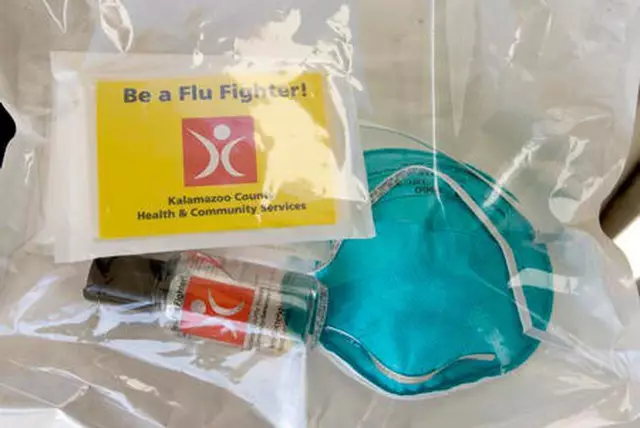- Author Rachel Wainwright wainwright@abchealthonline.com.
- Public 2023-12-15 07:39.
- Last modified 2025-11-02 20:14.
7 rules for treating flu
Unfortunately, we all have to deal with influenza almost every year. It would seem that such a common disease should already be studied up and down, and every person who has had it at least once (the number of such people in our country tends to 100%) should know the basic rules for its treatment. However, as the experience of doctors shows, things are different: often people, arrogantly believing that they are aware of how to be treated, make mistakes.
It is worth figuring out how to behave correctly if the seasonal epidemic has not passed you by.
It should be understood that there are no effective drugs that rid the body of the influenza virus. More precisely, there is, but they are used only in the most severe cases, since they are expensive and have side effects. As is the case with many other viral diseases, when treating influenza, the patient's main task is to create optimal conditions for the body to cope with the disease on its own. Influenza is one of those illnesses in which drug therapy is not the decisive factor, but measures taken and home remedies.
Isolation from healthy people
Influenza is transmitted by airborne droplets, so it is most likely to catch the virus during seasonal epidemics where there are large crowds of people. If the disease has caught up with you, think of others: do not expose healthy people to the risk of infection, do not go to public places, even when the disease is mild and you are relatively well. The more responsible you are about your social responsibilities, the less likely you are to get infected during seasonal peaks in incidence each year.

Source: depositphotos.com
Not carrying the flu on your feet
Unfortunately, in our country, an irresponsible attitude towards one's health is still maintained, which is expressed in the maximum possible ignoring of the disease. It is considered a special valor to go to work or school despite clear signs of the flu. In fact, there is nothing positive in this either for the sick person or for others: in addition to the fact that such a person is a source of infection, his own body, weakened by the disease, experiences serious overloads, which aggravates the course of the disease, prolongs the illness and contributes to the development of complications. The flu virus is by no means harmless, since it not only causes a runny nose and fever, but also damages blood vessels and negatively affects the nervous system. Doctors say that most people hospitalized with severe flu or complicationsas well as those for whom the disease ended fatally, found themselves in such a situation precisely after trying to habitually endure the "cold" on their feet.

Source: depositphotos.com
Drinking plenty of fluids
It is difficult to overestimate the importance of a drinking regime for a viral disease. You should drink a lot with the flu, the "drink when you want" formula is not suitable here: you need to drink more fluids than you want. It is advisable to keep a drinking mug within reach and refill it as soon as it is empty. As for drinks, it can be pure water (both with gas and without it), tea with lemon, compote, fruit drink. The use of solutions of pharmaceutical preparations for rehydration (for example, Rehydron) is encouraged, but this is not essential. The fluid entering the body helps to eliminate toxins from it and creates optimal conditions for the immune system to work, mobilized to fight the virus.

Source: depositphotos.com
Saline nasal treatment
The mucous membrane of the nose with respiratory infections is the most vulnerable spot, this is the entrance gate of infection. For the defense mechanisms to function properly, the mucous membrane needs moisture. Saline solution does an excellent job with this task. In addition, with its help it is good to cleanse the nose, it helps to improve nasal breathing. The solution can be instilled with a pipette or injected with a spray, if necessary, the nasal passages are washed with a small rubber bulb. Any saline solution will do. Pharmacy sprays Aqua Maris, Marimer and the like work great, but they are very expensive, so they can be easily replaced with pharmacy saline solution (it is ten times cheaper). You can make a saline solution at home using sea salt or even regular table salt:Dissolve 1/3 teaspoon of salt in 1 glass of boiled water.

Source: depositphotos.com
Taking antipyretic
Unlike other acute respiratory viral infections, which rarely cause hyperthermia, the flu is almost always accompanied by fever. Antipyretic drugs should not be taken at temperatures below 38 ° C, since an increase in body temperature has an important therapeutic effect: it activates the body's defenses to fight infection. If the temperature rises above 38.5 ° C, you can bring it down by taking paracetamol, or ibuprofen, or any other drug based on these (Nurofen, Bonifen, Dolgit, Tylenol, Calpol, Panadol, etc.). With the flu, you do not need to use acetylsalicylic acid (Aspirin) and preparations containing it, since with a viral infection this medicine can cause severe (in some cases even fatal) complications, and children are especially vulnerable in this regard.

Source: depositphotos.com
Light food
It is difficult to say where the myth that a sick person needs a strong diet came from. Probably from the times when most diseases were associated with exhaustion and forced starvation. In fact, a modern person who knows about hunger only from history books does not at all risk dying from lack of nutrition within a few days. With the flu, appetite decreases, sometimes even disappears completely, and this is the same protective mechanism as an increase in body temperature. The body directs all the forces to fight the disease, without spending them on digesting and assimilating food. That is why food should be light, not burdensome for the digestive system, and in less quantity than usual. During this period, fruits, vegetables, dairy and dairy products, light soups and cereals are useful. Fatty, fried, high-calorie foods should be avoided. Nothing bad will happen if the person does not eat at all during the most acute period of the flu, lasting two to three days. Excessive emaciation should not be feared, because after an illness, weight is quickly restored. Let's focus on the fact that this advice does not apply to drinking: it is imperative to drink more liquid.

Source: depositphotos.com
Maintaining optimal indoor humidity
Viruses thrive best in dry climates. That is why it is very important that the room where the sick person is located has sufficient humidity - at least 50%. The usual humidity in a heated room in winter, during seasonal epidemics, does not exceed 30%, and this is not enough. To maintain the required humidity and optimal microclimate, the room should be frequently ventilated, daily wet cleaning should be carried out, and small vessels with water should be placed near the central heating radiators. You can use a special electrical appliance - an air humidifier.

Source: depositphotos.com
In conclusion, we note that influenza belongs to acute respiratory viral infections (ARVI), and the rules for its treatment are correct for all ARVIs.
YouTube video related to the article:

Maria Kulkes Medical journalist About the author
Education: First Moscow State Medical University named after I. M. Sechenov, specialty "General Medicine".
Found a mistake in the text? Select it and press Ctrl + Enter.






